Social media use by teens has drawn significant attention from parents, journalists and lawmakers in recent years. The harmful things that stoke concerns include the amount of time teens spend on their screens, the ways teens may use social media to compare themselves with others, cyberbullying, and social media’s ability to lead some teens to radical views and actions.
“Social media has definitely had some negative influence on me, but overall, it has been an overwhelmingly positive effect. It allows me to connect with my friends in ways that would otherwise be impossible and has introduced me to many of my favorite books, movies, and games. I’ve also learned a lot from some platforms, like YouTube, which can be used for educational purposes too.” – Teen girl
Despite the concerns that have been raised about teens’ experiences online, teens largely see the time they spend on social media in a neutral or positive light. Indeed, teens are more likely to say that social media has a mostly positive – rather than negative – effect on their lives. And majorities say social media makes them feel more connected with friends, more accepted, like they have a support network, and like they have a creative outlet. Teens across major demographic groups express these sentiments.
However, teens’ experiences are not uniformly positive. About four-in-ten teens (38%) say they have felt overwhelmed by the drama they see on social media, while roughly three-in-ten (31%) say it’s made them feel excluded by their friends. There is also evidence that experiencing some of the negative sides of social media varies by gender, with teen girls being more likely than teen boys to report that things they come across on these platforms make them feel overwhelmed because of all the drama, like their friends are leaving them out of things, and worse about their own lives.
And while more teens say social media has had a mostly positive effect on their lives than say the opposite, teens’ views are different when the question involves the impact of social media on all teens. About a third of teens (32%) say social media is mostly negative for people their age, compared with about a quarter (24%) who think the effect has been mostly positive.
Another key dimension surrounding social media is digital privacy. Despite a majority of teens saying they feel like they have little to no control over the information social media companies collect about them, teens by and large are not too concerned about the amount of their personal information social media companies might have.
This rest of this chapter covers the range of teens’ views about the role of social media in their lives.
Teens more likely to view social media as having a negative effect on others than themselves
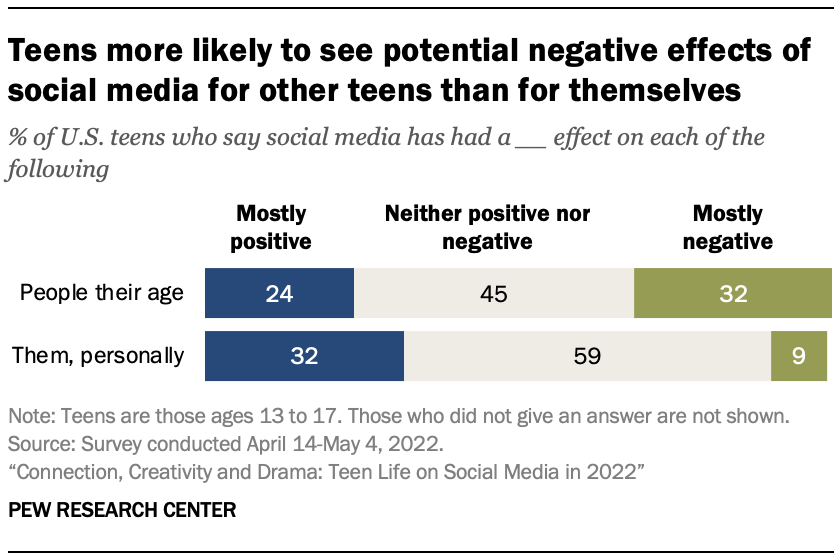
The effects of social media on young people has been a major topic of concern for years in the media, by lawmakers, from parents and from teens themselves. This survey shows that teens have a somewhat split sense of the kind of impact social media has: As a group, they are more downbeat about social media’s effect on teens in general than they are about its impact on their own lives. Specifically, when asked to reflect on the effects of social media on people their age, 45% of teens say these platforms have had neither a positive nor negative effect on people their age and 24% say that it has been mostly positive for teens. About a third of teens say social media has had a mostly negative effect on people their age.
When teens are asked to reflect on their personal experiences with social media, again, the largest share (59%) say social media has had a neither positive nor negative effect on them personally. Just 9% of teens say social media has had a mostly negative effect on them personally, and 32% say it has been mostly positive in their experience. These patterns are consistent across demographic groups.
Connectedness tops the positive outcomes teens report for using social media
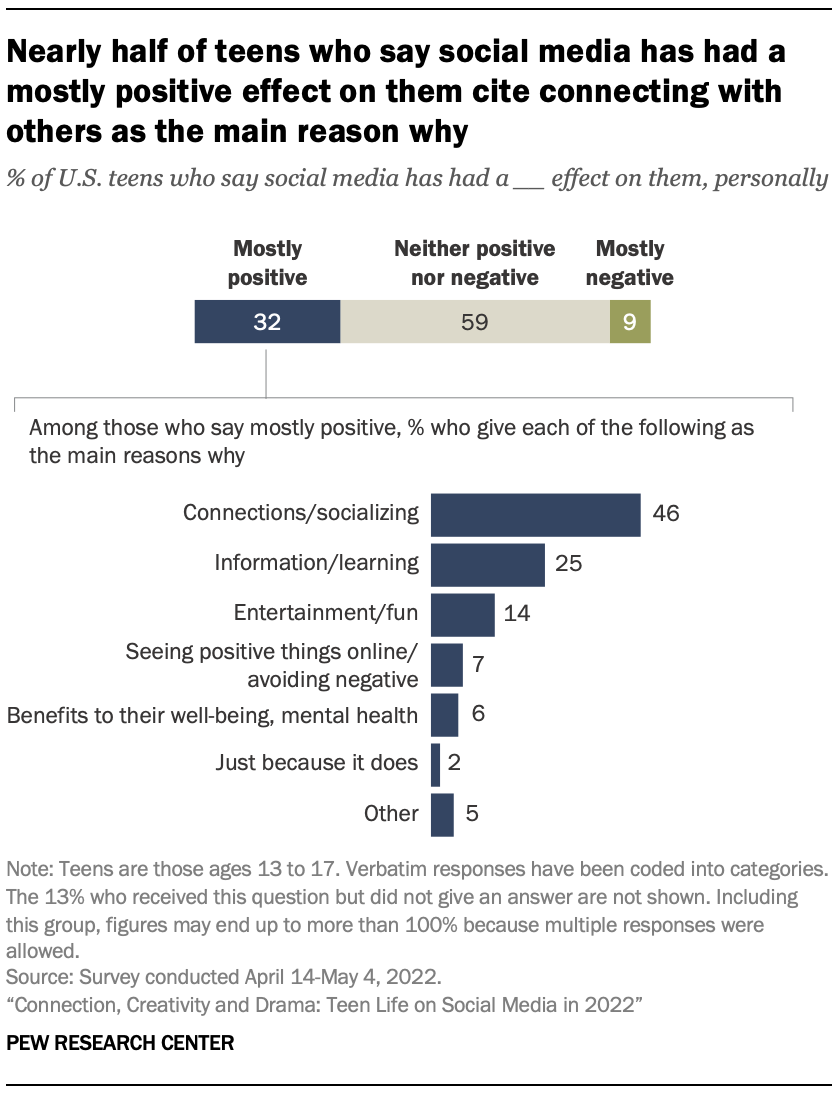
The benefits and potential pitfalls of teen social media use have been hotly contested in the public arena, with debates surfacing about how it may affect social development, mental health and education. To better understand the kinds of experiences youth have on social media, the survey asked teens to explain why they feel social media has a mostly positive or mostly negative effect on them.
Those who say social media has a mostly positive impact give a range of reasons for why that’s the case. Nearly half describe the benefits of socializing on these platforms or the ability to build or maintain connections with others while using social media:3
“I get to talk to my friends that I can’t spend time with because of this virus, and I no longer live in the same area or go to the same school as my friends that I grew up with.” – Teen girl
“I am kind of socially awkward and making friends in person has often been difficult. Currently, I have a couple long time friendships online and talk with them practically daily.” – Teen boy
A quarter of those who say social media has had a mostly positive effect on them personally mention how social media helps them learn or find information:
“On YouTube, I can easily access helpful videos and news alongside entertainment. YouTube has actually been an integral part of several of my classes as it helped people learn how to use software … or even had resources I used to complete projects.” – Teen boy
“You can experience things that you don’t have the time or ability to experience, it also passes time and can teach you many important life skills that you may not learn until much later.” – Teen girl
Meanwhile, 14% of teens who say social media has been mostly positive for them point to the entertainment value they see in social media:
“I enjoy looking at memes and funny videos. I don’t watch things that would make me feel bad about myself. I only look at the funny things.” – Teen girl
“I just like to watch videos and be entertained. I don’t really let it affect me if someone is mean or something because that is something that just happens sometimes.” – Teen boy
Smaller shares of teens who see the personal effects of social media as positive explain that it is because they curate their social media experiences to focus on positive things or avoid negative things on these platforms, it benefits their well-being, or it just does have a positive effect on them.
The survey also covered more general questions about the possible positive and negative effects teens may have experienced while using social media, regardless of whether they had an overall positive or negative view about social media in their lives. In response to those questions, teens in general report feeling a variety of positive things when using social media, with connectedness to others topping the list. Eight-in-teen teens say that what they see on social media makes them feel more connected to what is going on in their friends’ lives, with a third saying they feel this a lot. About seven-in-ten teens (71%) say what they see makes them feel like they have a place where they can show their creative side, and roughly two-thirds (67%) say it makes them feel like they have people who can support them through tough times. Overall, 58% of teens say that what they see on social media makes them feel more accepted.
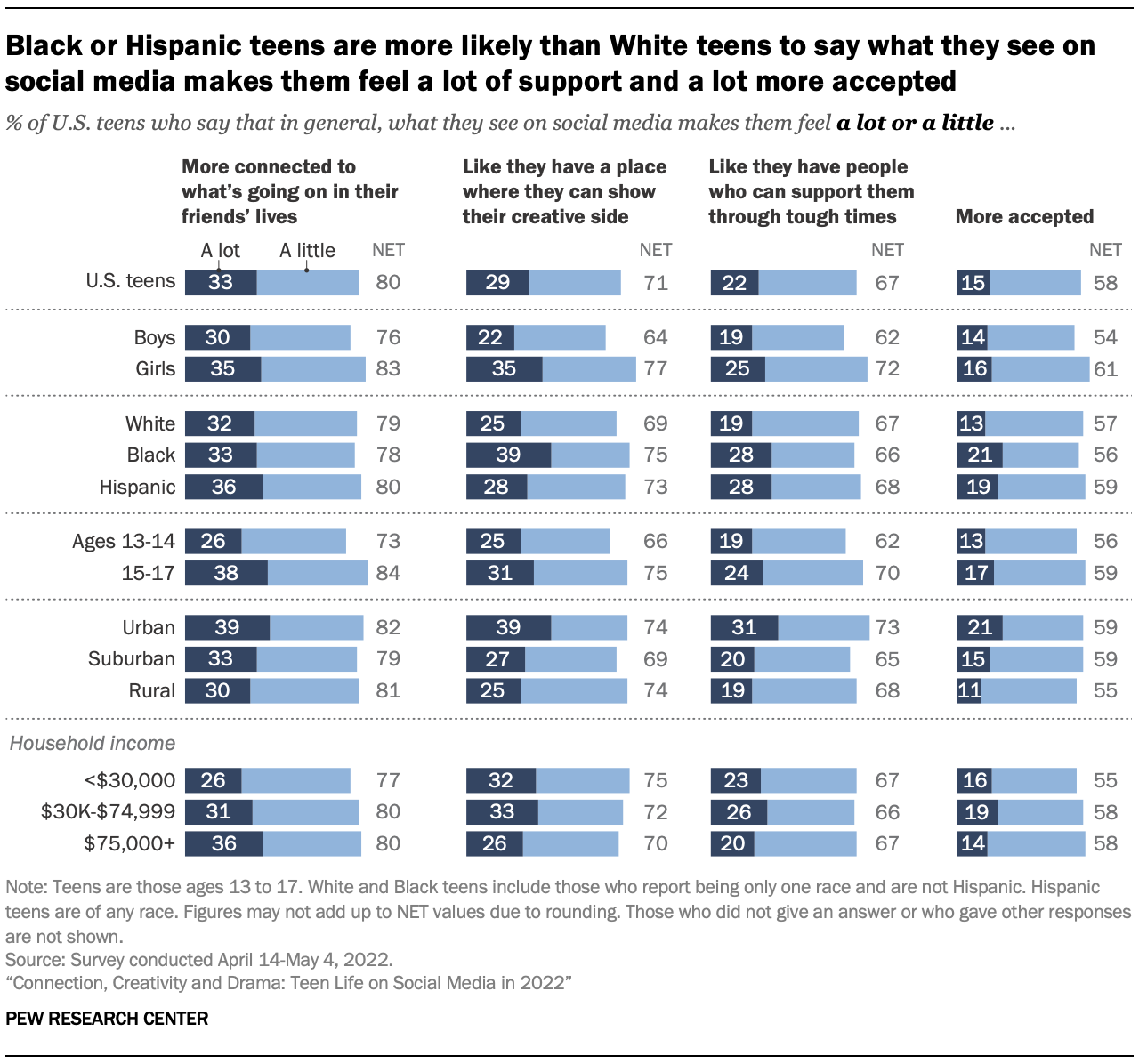
Roughly half or more of teens across demographic groups say they feel each of these four things. There are only a few demographic differences in the shares of teens who say they feel these things at least a little. Differences are more common when looking at teens who say they feel certain positive experiences a lot.
While teens’ experiences with feeling a lot more accepted and connected with their friends do not statistically differ across genders, teen girls are more likely than teen boys to say that what they see on social media makes them feel a lot like they have a place to express their creativity or like they have people who can support them.
In higher shares than White teens, Black or Hispanic teens say what they see on social media makes them feel a lot like they have support and a lot more accepted.4 Furthermore, Black teens are particularly likely to feel like social media gives them a creative outlet – with about four-in-ten saying that what they see on social media makes them feel a lot like they have a place where they can show their creative side, compared with about a quarter of White or Hispanic teens.
There are also age differences. Teens ages 15 to 17 are more likely than those 13 to 14 to say the things they see on social media make them feel a lot more connected to their friends’ lives (38% vs. 26%) and like they have a place where they can show their creative side (31% vs. 25%).
Urban teens stand out from suburban and rural teens when it comes to feeling a lot like social media provides them with a creative outlet and a solid support system. Urban teens are also more likely than rural teens to say what they see on social media makes them feel a lot more accepted.
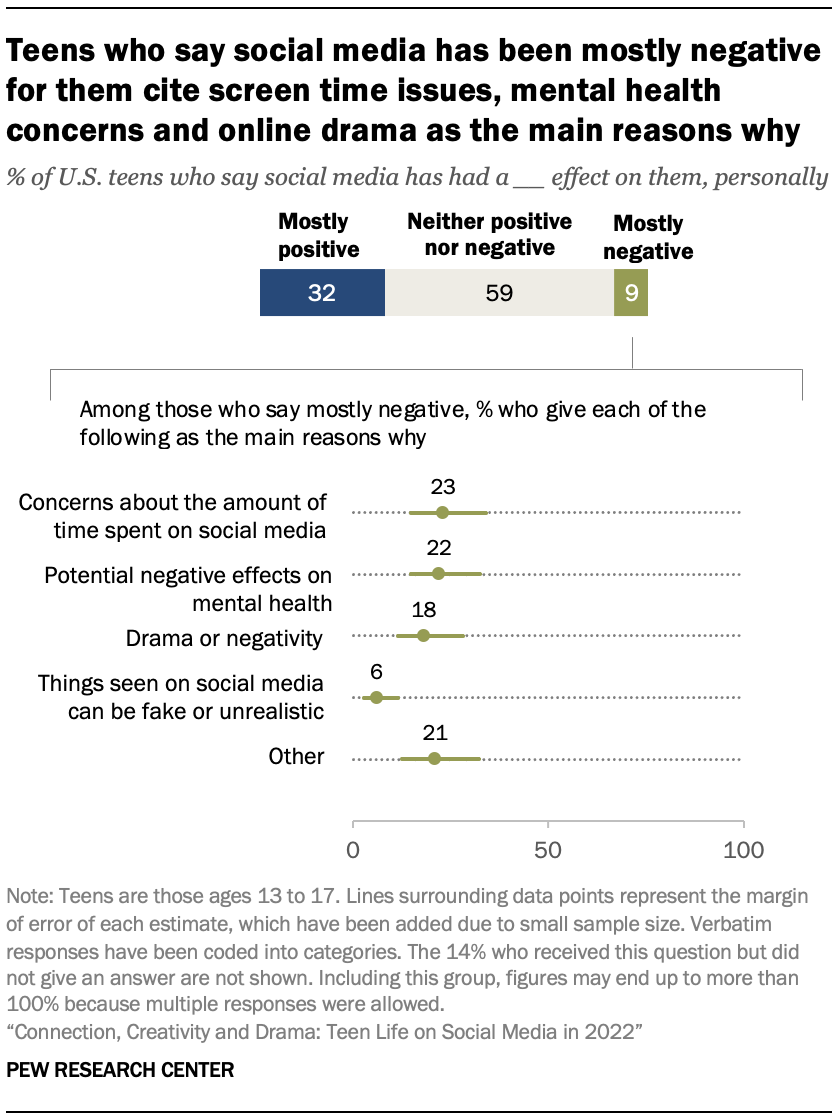
Teen girls more likely than teen boys to cite certain negative experiences on social media
About one-in-ten teens (9%) see their experiences with social media as mostly negative. In their open-ended explanations for why they feel this way, these teens describe several kinds of struggles. Some 23% of these teens say concerns about the time spent on social media is the main reason why they feel this way:5
“I think social media has had a negative effect on me because the more I’m on it the less I’m socially active. I feel like social media has become something I cannot live without, almost like a second limb.” – Teen boy
“I can do better things with my time and go out with my friends and not talk to people over a screen.” – Teen girl
“It causes me to procrastinate on homework or other tasks.” – Teen boy
A similar share (22%) says the potential negative effects on mental health are the main reason why social media’s effect on them personally has been mostly negative:
“I used to spend a lot of time comparing myself to people online. It was a huge distraction and made me feel bad about myself.” – Teen boy
“Pressure, comparing myself, cyberbullying, stuck in a loop of social media, having an empty-feeling effect after use, going down rabbit holes of comparing myself, overwhelming.” – Teen girl
About a fifth of teens who say the effect of social media has been mostly negative for them say drama or negativity is the primary reason for their answer:
“Too much negativity from many people complaining or being aggressive towards different topics.” – Teen boy
“People try to make you feel bad about what you’re doing or how you look.” – Teen girl
“I have gotten bullied on social media … people are rude.” – Teen girl
A small share of these teens (6%) point to some things seen on social media being fake or unrealistic as the main reason they think social media has been mostly negative for them personally:
“It leads to you comparing yourself to unrealistic standards.” – Teen boy
“Things are in a perfect world in social media, false.” – Teen girl
When asking teens in general about possible negative experiences on the platforms, about four-in-ten say that what they see on social media makes them ever feel overwhelmed because of all the drama (38%). Roughly three-in-ten say it makes them feel at least a little pressure to post content that will get lots of comments or likes (29%) or like their friends are leaving them out of things (31%). And 23% say what they see on social media makes them feel at least a little worse about their own life. Only about one-in-ten or fewer teens say they feel each of these four things a lot.
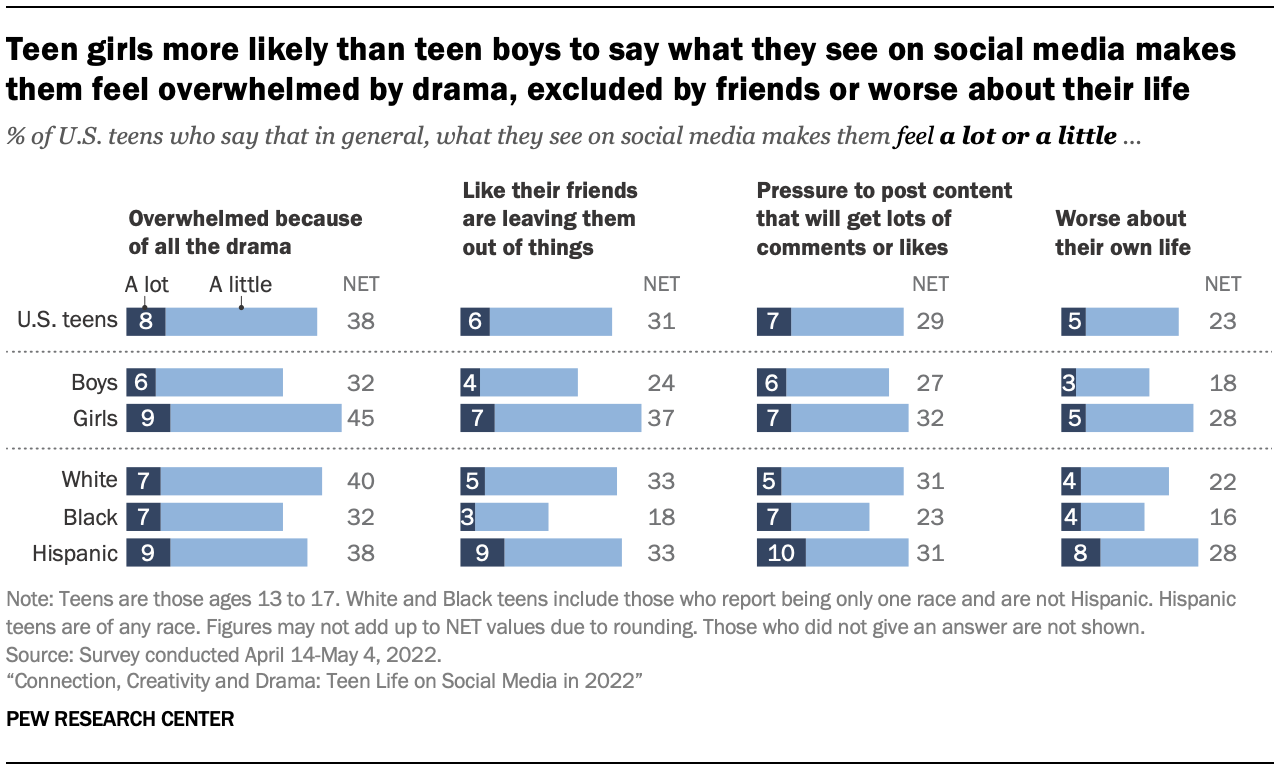
Compared with teen boys, teen girls more frequently say that what they see on social media makes them feel overwhelmed because of all the drama (45% vs. 32%), like their friends are leaving them out of things (37% vs. 24%), and worse about their own lives (28% vs. 18%).
White or Hispanic teens are roughly twice as likely as Black teens to report that what they see on social media makes them feel excluded by their friends (33% vs. 18%). In addition, Hispanic teens are more likely than Black teens to say social media makes them feel worse about their lives (28% vs. 16%).
Pluralities of teens say teen experiences on social media are better than parents think and believe their parents aren’t too worried about their use
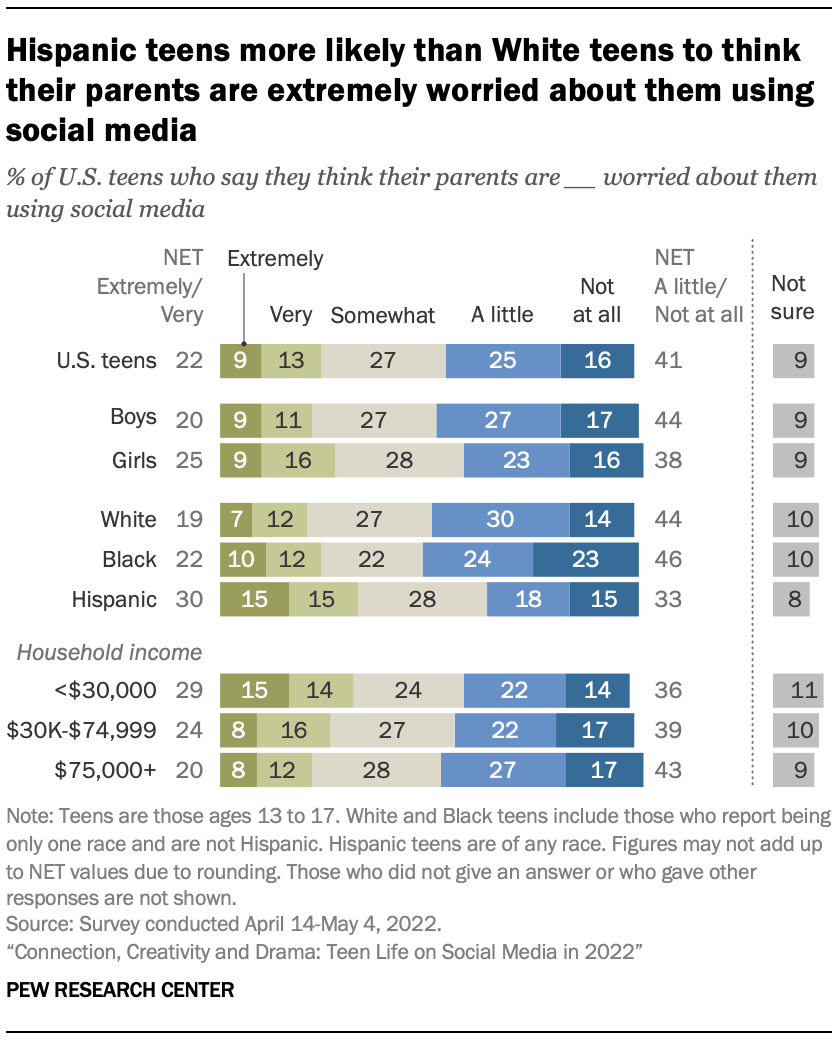
Prior Center research has found that majorities of parents express a variety of worries when it comes to teen social media use. However, only a minority of teens think their parents are extremely or very worried. Some 22% of teens say they think their parents are extremely or very worried about them using social media, including 9% who say their parents are extremely worried. But larger shares of teens – about four-in-ten – think their parents are not at all (16%) or a little worried (25%) about them using social media. About quarter of teens (27%) fall more in the middle, saying they think their parents are somewhat worried. An additional 9% say they are not sure.
Teens’ perceptions about the way their parents view their social media use vary somewhat by race and ethnicity as well as household income. White and Black teens are more likely than Hispanic teens to say they think their parents are not at all or a little worried about their social media use. In addition, Hispanic teens stand out from White teens in saying they think their parents are extremely worried (15% vs. 7%).
Teens from lower-income households are more likely than more affluent teens to characterize their parents as being extremely worried about their use of social media. Some 15% of teens from families with household incomes less than $30,000 a year say their parents are extremely worried about them using social media. By comparison, smaller shares from households making $30,000 to $74,999 annually or $75,000 or more say their parents are extremely worried (8% each).
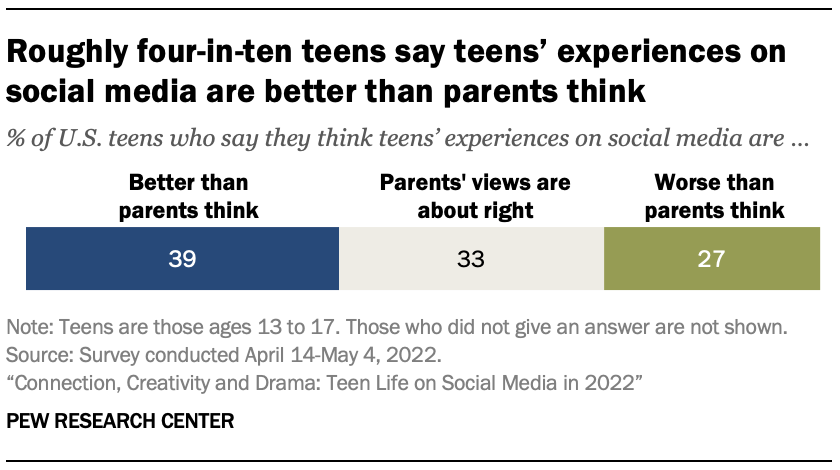
Teens overall may not see their own parents as particularly worried about their social media use, but many teens believe there is a disconnect between parental perceptions of teen experiences on social media and their lived realities. Some 39% of teens say teens’ experiences on social media are better than parents think, and 27% say they are worse. A third of teens say parents’ views are about right when it comes to teens’ experiences on these platforms.
Teen opinions on this topic do not differ across most key demographic breaks, but they do vary based on teens’ perceptions of social media’s effect on people their age. Fully 58% of teens who say that social media has had mostly positive effects on people their age say teens’ experiences on social media are better than parents think, compared with 39% of those who say social media has been neither positive nor negative who say the same. Teens who say social media has had mostly negative effects on teens in general are even less likely to say teens’ experiences on social media are better than parents think, with 23% saying this.
Conversely, teens who say social media has been mostly negative for people their age (43%) are more likely to say teens’ experiences on social media are worse than parents think when compared with those who say the effects have been neither positive nor negative (22%) or mostly positive (15%).
Majority of teens feel little to no control over their data being collected by social media, but just a fifth are extremely or very concerned about it
Today’s youth have grown up in a world where online data collection is the norm. In this survey, a majority of teens say they feel like they have little to no control over their personal information being collected by social media companies. However, a plurality of teens say they are not too concerned about this information being collected by these companies.
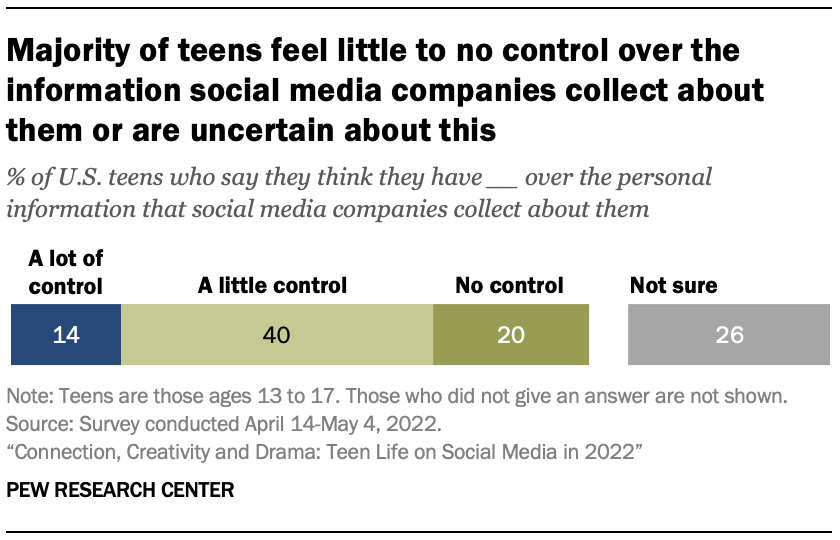
Many do not feel they are in the driver’s seat when it comes to controlling what information social media companies collect about them. Fully 60% of teens say they think they have little (40%) to no control (20%) over the personal information that social media companies collect about them. Another 26% express that they do not know how much control they have. Just 14% of teens think they have a lot of control over the personal information that social media companies collect about them.
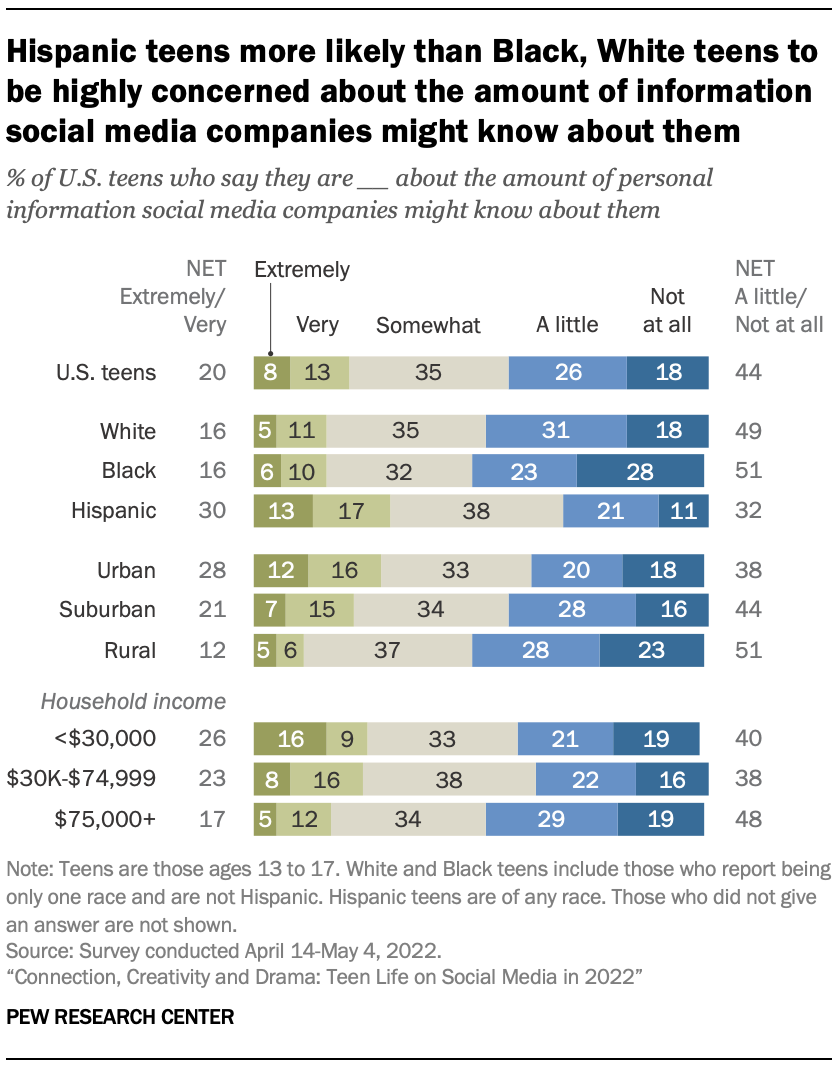
While a fifth of teens say they are extremely or very concerned about the amount of personal information social media companies might know about them, more than twice as many teens (44%) express little to no concern. Some 35% of teens fall in the middle, reporting that they are somewhat concerned about how much of their personal information is in the hands of social media companies.
Hispanic teens are more likely than White or Black teens to say they are extremely or very concerned about how much social media companies know about them. In addition, teens from households making under $30,000 annually are more likely than teens from households making $75,000 or more to say they are at least very concerned.
Teens who live in different types of communities have different feelings about how much data social media companies have on them. Urban and suburban teens are more likely to express higher levels of concern compared with their rural counterparts. The difference between urban and rural teens is notably stark, with about three-in-teen urban teens being very or extremely concerned about the amount of personal information social media companies might know about them versus roughly one-in-ten rural teens who report feeling this way.
In their own words: Teens explain what they think social media companies do with their data
While the survey focuses on companies’ access to teens’ data, teens in our supplementary focus groups explain how they primarily view privacy issues through the lens of needing to protect their information from other people. This person-focused emphasis on privacy is in line with academic research which finds that teens are more likely to take steps to protect their information from other people rather than from companies.
When asked to reflect on what they think companies might do with their data, a few teens share that they haven’t given it much thought. However, several mention thinking that social media companies are likely tracking them:
“Social media groups use [data] to get insight on what people are into, or what they think users spend most of their time doing. So, it’s more like they still use it to get better data on people, on what people spend most of your time doing, searching online and that’s just what I think. I’m not really sure.” – Teen boy
“Something that I always felt was kind of weird about social media is, let’s say you search up one thing on a platform and then it appears on another. So, that does show that social media does use that information. … It’s weird to know that they’re tracking certain things. Like, let’s say I’m shopping for something on one account and then it pops up as an ad for something else. It makes me a little uncomfortable almost.” – Teen girl
Other teens note that they know companies sell their data and use it for targeted advertising:
“I’ve seen some things like about it. I’m pretty sure they take the information about what you’re interested in and things like that. And then they sell that to advertisers to try and get you to buy their products and things like that.” – Teen boy
“In grade school, I’m pretty sure one of my teachers did a study [where] she posted something online and then on her Amazon account she was getting recommended stuff [based] on what she posted. So I think they try to get you to buy things off what your interests are.” – Teen boy
For more quotes and themes from the focus groups, see Chapter 3.




